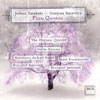Bacewicz; Zarebski Piano Quintets
Full-blooded performances of two highly contrasted Polish quintets
View record and artist detailsRecord and Artist Details
Composer or Director: Grazyna Bacewicz, Juliusz Zarebski
Genre:
Chamber
Label: Dux Recordings
Magazine Review Date: 13/2006
Media Format: CD or Download
Media Runtime: 56
Mastering:
Stereo
DDD
Catalogue Number: DUX0530

Tracks:
| Composition | Artist Credit |
|---|---|
| Quintet |
Juliusz Zarebski, Composer
Juliusz Zarebski, Composer Warsaw Piano Quintet |
| Piano Quintet No. 1 |
Grazyna Bacewicz, Composer
Grazyna Bacewicz, Composer Warsaw Piano Quintet |
Author: Guy Rickards
Juliusz Zarebski (1854-85) was a renowned pianist and composer, garnering high praise from Liszt (who took him as a pupil) and Borodin. His tragedy was that, although born in the same year as Janácek, he predeceased both Borodin and Liszt. His reputation today rests on his marvellous G minor Piano Quintet, composed shortly before his death from tuberculosis (CPO, though, have just released a disc of some of his piano music).
Liszt’s influence is pervasive, not least in the music’s formal assurance and freedom. It was a novel stroke to start the Scherzo and the almost-rondo finale with the same theme but such is the verve of the writing there is no hint of lack of invention. The finale draws all the thematic threads together, redeveloping material from the preceding movements, especially the sunny, opening Allegro. The newly reformed Warsaw Piano Quintet give a superbly rounded account, catching its late-romantic fervour as well as, in the later movements, its forward-looking aspect.
Born half a century later, Grazyna Bacewicz (1909-69) achieved fame as a violinist and composer though again her music is not as widely known as it deserves. The first of her two piano quintets (1952) is in the lively folk-derived style required of Polish composers by the regime of the day. Bacewicz made a virtue of this restriction, balancing neo-romantic warmth with classical litheness. It is a winning combination, winningly delivered by the Warsaw Quintet.
Polskie Nagrania recorded Bacewicz’s quintet in 1969 (reissued on Olympia – both nla) with the same ensemble though viola-player Stefan Kamasa is the only common member. Dux’s recording has the greater depth and warmth, though as performances there is not much to choose between them.
Liszt’s influence is pervasive, not least in the music’s formal assurance and freedom. It was a novel stroke to start the Scherzo and the almost-rondo finale with the same theme but such is the verve of the writing there is no hint of lack of invention. The finale draws all the thematic threads together, redeveloping material from the preceding movements, especially the sunny, opening Allegro. The newly reformed Warsaw Piano Quintet give a superbly rounded account, catching its late-romantic fervour as well as, in the later movements, its forward-looking aspect.
Born half a century later, Grazyna Bacewicz (1909-69) achieved fame as a violinist and composer though again her music is not as widely known as it deserves. The first of her two piano quintets (1952) is in the lively folk-derived style required of Polish composers by the regime of the day. Bacewicz made a virtue of this restriction, balancing neo-romantic warmth with classical litheness. It is a winning combination, winningly delivered by the Warsaw Quintet.
Polskie Nagrania recorded Bacewicz’s quintet in 1969 (reissued on Olympia – both nla) with the same ensemble though viola-player Stefan Kamasa is the only common member. Dux’s recording has the greater depth and warmth, though as performances there is not much to choose between them.
Discover the world's largest classical music catalogue with Presto Music.

Gramophone Digital Club
- Digital Edition
- Digital Archive
- Reviews Database
- Full website access
From £8.75 / month
Subscribe
Gramophone Full Club
- Print Edition
- Digital Edition
- Digital Archive
- Reviews Database
- Full website access
From £11.00 / month
Subscribe
If you are a library, university or other organisation that would be interested in an institutional subscription to Gramophone please click here for further information.




